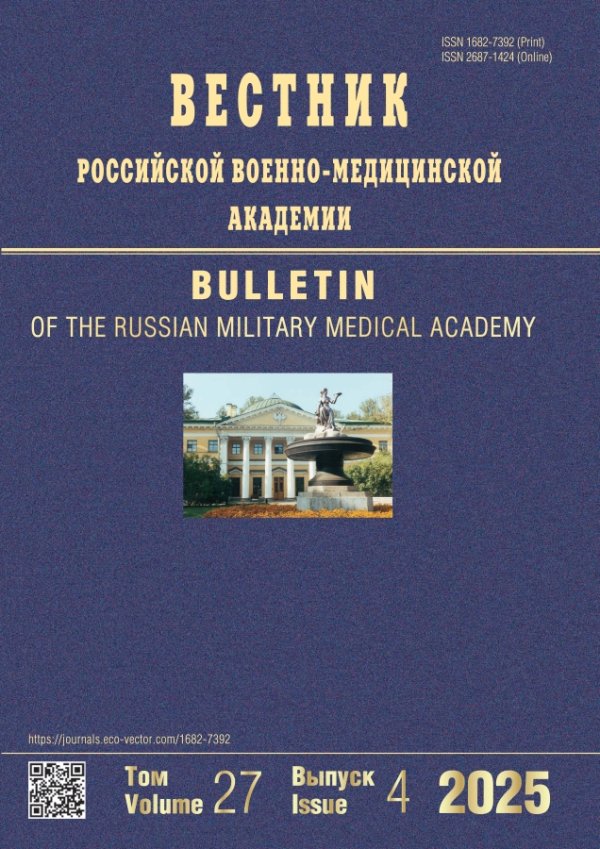Characterological profile of cadets of the naval educational institution as an indicator of their professional adaptation
- Authors: Zaitsev A.G.1, Soshkin P.A.1, Zabrodsky D.S.1
-
Affiliations:
- State Research Test Institute of Military Medicine of the Ministry of Defence of the Russian Federation
- Issue: Vol 23, No 2 (2021)
- Pages: 29-38
- Section: Clinical trials
- URL: https://journals.rcsi.science/1682-7392/article/view/62960
- DOI: https://doi.org/10.17816/brmma62960
- ID: 62960
Cite item
Abstract
A 2-stage comprehensive psychological and physiological examination of freshmen of a higher naval educational institution was carried out. At the first stage, characteristic profiles of cadets were determined. At the second stage, the identified characteristic profiles were correlated with the traditional criteria for military-professional adaptation. It was found that the most often examined young men (according to the Leonhard – Schmiszek technique) have such character accentuations as hypertimicity (81.8%) and demonstrability (53.1%), less often — stuck (39.3%), pedanticity (19.6%), emotion (18.2%), exaltation (15.4%), and even less often — cyclothymic (8.4%), excitability (7.7%), anxiety (2.8%) and dysthymic (2,1%). Cadets assigned to the “passive-aggressive” stereotype group manage worse in the main disciplines than cadets from other groups. Cadets with “passive-aggressive” stereotype have lower academic performance as compared to other groups. They have lower expert scores in discipline, neuropsychic stability, communication skills, credibility in a team and level of general culture. In addition, in cadets of this group, the mobility of the main nervous processes at the level of the motor analyzer is somewhat lower to the comparison group. The study showed that the characterological features in the form of mixing or opposing accentuations of characters revealed in cadets play in favor of their personal development, health and successful study only in about 20–40% of cases. In other cases, these character features do not contribute to this and can develop into personal disorders incompatible with military service during the training process. Based on the results of the study, psychological and pedagogical tasks were formulated to improve the system of selecting of cadets for naval educational institutions and to improve their professional education.
Full Text
##article.viewOnOriginalSite##About the authors
Anton G. Zaitsev
State Research Test Institute of Military Medicine of the Ministry of Defence of the Russian Federation
Author for correspondence.
Email: valeeg@yandex.ru
ORCID iD: 0000-0001-5673-5039
SPIN-code: 4915-5781
doctor of medicine
Russian Federation, St. PetersburgPavel A. Soshkin
State Research Test Institute of Military Medicine of the Ministry of Defence of the Russian Federation
Email: soshkin-med@yandex.ru
SPIN-code: 2975-5848
Scopus Author ID: 644092
candidate of medicine
Russian Federation, St. PetersburgDmitry S. Zabrodsky
State Research Test Institute of Military Medicine of the Ministry of Defence of the Russian Federation
Email: diz-06@mail.ru
SPIN-code: 8849-9014
Russian Federation, St. Petersburg
References
- Chigrina IY. Problems of adaptation of first-year cadets of higher military educational institutions. Theorya i practica obchestwennogo raswitia. 2014;(11):70–72. (In Russ.).
- Mazhuev AV. Monitoring the readiness of cadets for training in a military engineering university. Vestnik Stavropol’skogo universiteta. 2008;(59):169–174. (In Russ.).
- Lazutkin VF. The problem of adaptation of cadets in the process of training at a military university. Woennaja mysl’. 2007;(8):54–62. (In Russ.).
- Kirichuk VF, Shmatov AP. Comprehensive assessment of adaptation to the conditions of military service among cadets of higher military educational institutions. Woenno-medicinkij gurnal. 2008;329(10):60–61. (In Russ.).
- Timofeev DA, Tsvigailo MA. Adaptation of cadets with different categories of professional psychological selection to training conditions at the military aviation institute of radio electronics. Bulleten’ rossijskogo universiteta drugby narodov. Seria: Medicina. 2009;(4):287–289. (In Russ.).
- Boyceruk A, Gubin V. Adaptation of cadets to educational and professional activities. Morskoj sbornik. 2006;(8):38–40. (In Russ.).
- Dobryak SY. Dynamika psyhologicyeskoj adaptacii kursantov na pervom i wtorom godu obucyenija v voennom vuse [dissertation abstract]. St. Peterburg; 1999. (In Russ.).
- Panchenko LL. Psychophysiologicheskaya adaptacia kursantov morskih special’nostej na nachal’nyh etapah professionalnjgo obrazowanija [dissertation abstract]. Vladivostok; 2005. (In Russ.).
- Parshukova LP, Vyboyshch IV. Akcentuacii haraktera. Chelyabinsk: Publishing Center YuUrGU; 2007. (In Russ.).
- Maklakov AG. Personal adaptive potential: its mobilization and forecasting in extreme conditions. Psychol. Journal. 2001;22(1): 16–24. (In Russ.).
- Harman GG. Sovremennyi factornyi analys. Moscow: Statististika; 1972. (In Russ.).
- Mitina OV, Mikhailovskaya IB. Factornyi analys dlya psychologov. Moscow: UMK Psychology; 2001. (In Russ.).
- Zaitsev AG, Zaitsev GK, Smurov AV. Preserving and strengthening the health of military personnel as a psychological and pedagogical task. Woenno-medicinkij gurnal. 2005;326(5):47–50. (In Russ.).
Supplementary files









